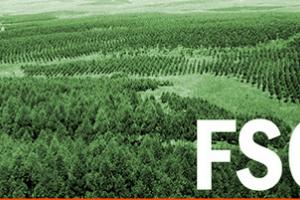In our previous issue (WRM bulletin 109) we made reference to the promotion of oil palm plantations, denouncing their negative impacts on the Amazon forest and on displaced peasants.
The wave of plantations continues, with other types of alien trees. In July of this year the National Reforestation Plan was submitted, promoting plantations for commercial and industrial purposes. Adopted in January 2006, the plan set out an average annual rate of plantation of 104,500 hectares from now until the year 2024.
The Green Economy
The Green Economy is a tactic used to “clean up” the image of corporations rather than address corporate capture and capitalism as the true drivers of deforestation. False solutions promoted under the Green Economy include certification, sustainable forest management, ecosystem services, REDD+, the bioeconomy, nature-based climate solutions, and zero net deforestation. Rather than stopping it, these “solutions” support corporate-driven destruction that is causing a deep social and ecological crisis.
Other information
30 September 2006
Bulletin articles
30 September 2006
When a forestry operation is certified under the Forest Stewardship Council system, it should mean we can all relax in the knowledge that the forests are reasonably well managed. Unfortunately, it seems, this is not the case. SmartWood, an FSC accredited certifier, recently certified forestry operations in Laos which are producing timber that is illegal under the Lao Forestry Law.
1 September 2006
Press Release - September 1, 2006
Other information
1 August 2006
The Finnish company Oy Metsä-Botnia Ab (Botnia’s trade name) established in 1973, is the second largest pulp producer in Europe. It has four subsidiary companies, two of which are located in Uruguay: Compañia Forestal Oriental S.A. (FOSA), that has eucalyptus plantations; and Botnia S.A. established in 2003 to implement the project to install a pulp mill producing one million tons per year.
Bulletin articles
2 July 2006
With regards to plantation certification, FSC has reached a crossroads where no less than its credibility is at stake. The internal process for the review of plantation certification is fairly advanced and in September this year the Working Group set up for this purpose will submit its recommendations.
Bulletin articles
2 July 2006
In November 2002, Forest Stewardship Council's General Assembly passed a motion requiring FSC to revise its plantation policy. At the time, an area of 3.3 million hectares of plantations had been certified as well managed under the FSC system.
Almost two years later, FSC launched a Plantations Review at a meeting in Bonn, Germany. By then, the area of FSC certified plantations had increased to 4.9 million hectares.
Other information
2 July 2006
The Alert against the Green Desert Movement is a broad network of opposition to the expansion of large scale eucalyptus tree plantations in the region which covers the States of Minas Gerais, Espirito Santo, Bahia and Rio de Janeiro and Rio Grande do Sul. Its existence and struggles arose from the proven social and environmental impacts of these plantations, some of which presently enjoy FSC certification.
Bulletin articles
2 July 2006
Currently the main plantation companies operating in Australia certified by FSC are: Albany Plantation Forest Company Pty Ltd (23,509 ha), Timbercorp Forestry Pty Ltd. (97,000 ha), Integrated Tree Cropping Limited (166,536 ha), Hancock Victorian Plantations Pty. Limited (246,117 ha).
Bulletin articles
2 July 2006
In 2003, WRM paid a field visit to Colombia to acquaint itself with the communities affected by Smurfit plantations and to gather evidence. At that time, we published the following in an article:
“…The local people told us that ‘the plantations have finished off the water,’ that “spraying has finished with everything there was in the soil,’ that ‘there is hardly any fauna left,’ that there used to be ‘clouds of birds’ and that now ‘only in the summer does some bird appear, but not in winter time,’ and that ‘there are no fish left either.’
Bulletin articles
2 July 2006
In April 2006, the German certifying firm GFA Consulting Group granted the FSC seal to Endesa-Botrosa’s timber operations and to its tree plantations located in the Rio Pitzara plot covering 8,380 hectares on the Ecuadorian coast (GFA-FM/COC-1267). FSC certification of Endesa Botrosa, belonging to the Durini Timber Group, represents a severe setback to the hundreds of local peasant, indigenous and Afro-Ecuadorian communities whose forests and livelihoods have been devastated for decades by this company.
Bulletin articles
2 July 2006
In the last few centuries, there has been a massive deforestation of Irish land. What has been replaced, has been by and large replaced with foreign exotic near-monoculture conifer plantations, mainly by one company: Coillte, which owns 438,000ha of certified plantations.
In 2002, Coillte Teoranta obtained Forest Stewardship Council certification from the Soil Association/Woodmark (they were formerly certified by SGS).
However, certification of these plantations has been strongly criticised in Ireland for a number of reasons, among which because they:
Bulletin articles
2 July 2006
For over a year now, Spanish organizations have been demanding the annulment of the certification of “sustainable forestry management” granted by FSC to a branch of the ENCE (Norfor) pulp/plantation company, but so far with no results. In June 2005, the “Asociación pola defensa da Ria”(Association for the defence of the Ria), a member of the Galician Ecologist Federation (FEG) submitted an urgent request for the annulment of such certification (http://www.wrm.org.uy/actores/FSC/cancelacionNORFOR.pdf) to FSC’s delegation in Spain, accompanied by a critical report on Norfor’s certification.

